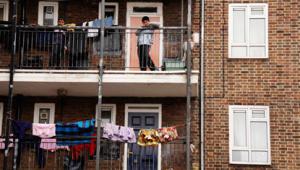A study of household spending by the economic think-tank found that wage reductions had hit well-off households after the financial crisis in 2007/08, while many poorer households were initially relatively well protected by the benefits system.
But this would change by the end of 2015/16 as welfare cuts kicked in, including a £26,000 annual limit on household benefits and a 1% cap on rises.
The net result is that income losses after the recession will be spread evenly across income groups by March 2016, research for the institute’s Fiscal studies journal concluded.
In the first comprehensive estimate of the distributional impact of the recession, researchers found that for those on middle and higher incomes, net household income mainly fell between 2009/10 and 2011/12. For those on lower incomes, who were more dependent on top-ups from the state, reductions in real incomes were happening largely as a result of welfare cuts. These began later, after the recession following the financial crisis, but are now set to continue beyond 2015/16.
As a result of this delay, income inequality in the UK fell ‘substantially’ between 2007/08 and 2011/12, researchers found. However, it is projected to rise again from 2011/12, returning to almost pre-recession levels by 2015/16.
Overall, the percentage loss of income predicted from 2007/08 to 2015/16 is fairly constant across all groups, the report found.
At the high end of the scale, incomes of the tenth percentile of households are expected to fall by 3.4%, measured against the Retail Prices Index measure of inflation. Those on median incomes will lose 5.4% over the same period, and those in the 90th percentile 5.5%.
Robert Joyce, a senior research economist at IFS and one of the authors of the paper, said if the Office for Budget Responsibility’s macroeconomic forecasts were correct, then most of the decreases in real incomes for middle- and higher-income groups had already happened.
But much of the pain for lower-income groups was occurring now or was still to come, because these groups were the most affected by the ongoing cuts to benefits and tax credits.
‘Overall, we expect the period of recession followed by austerity to leave income inequality in 2015/16 about the same, or slightly lower, than in 2007/08,’ Joyce said.
The full paper will be published on June 12.






















